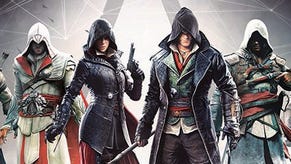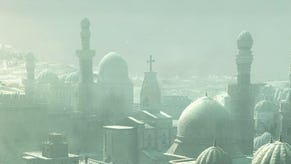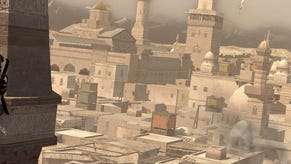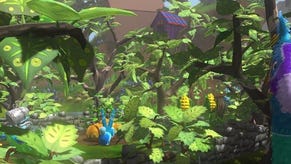Assassin's Creed: Brotherhood
Top of the Popes.
Did you know there is an amusing Metal Gear Solid cameo in Assassin's Creed: Brotherhood? It's an apt inclusion really, because while it can't quite hold a candle to the eccentricities and convolutions of Hideo Kojima's labyrinthine stealth-action saga, Assassin's Creed is certainly getting there.
Let's recap. You are a man named Desmond Miles, who spends most of his days strapped to a machine called the Animus. The Animus lets Desmond relive the genetic memories of his ancestors, who happen to be an order of Assassins, locked for millennia in a struggle against the naughty Templars who want to subjugate humanity for the greater good.
Desmond was first captured by the Templars, who wanted to use him to find the legendary Pieces of Eden, objects of unspeakable power and potentially otherworldly origin. But he was snatched up by present-day Assassins... who wanted to use him to find the legendary Pieces of Eden so the Templars couldn't get their hands on them.
But you really spend the majority of the games dealing with his ancestors - in the first it was Altair, who ran amok across the Middle East taking out influential Templars before it turned out his boss was a bit shady. Assassin's Creed II gave us the charismatic Ezio Auditore, who journeyed around Renaissance Italy avenging his murdered father and eventually confronting the Templars responsible and - spoiler - becoming a vessel for communication between the source of the Pieces of Eden and Desmond in the present day.
It all sounds rather simple when you put it like that, which is probably why the games never did put it like that. Instead, they conveyed it through a mixture of elaborate sermons from key characters, clues and mysteries in the environment, and good old-fashioned voice-overs from Desmond's support team.
All of which left us at a tantalising and pivotal stage when the curtain fell on Assassin's Creed II. What we really wanted was the next chapter. Brotherhood, which is not Assassin's Creed III, has the unenviable task of delivering on a promise it's not really designed to keep.
But enough "previously on Assassin's Creed" - not least because Brotherhood picks up where its predecessor left off in more ways than we had dared to hope. Ezio returns to Rome in full this time, rather than just invading the Vatican, and discovers that it is not only rife with his enemies the Borgia - key Templars of the era - but as vast and magnificent as the cities of Assassin's Creed II put together.
We also get to see more of what Desmond and the Scooby gang of modern Assassins he hangs around with are up to, and while marginally less dramatic than the previous instalment, revelations outside the Animus remain artful and carefully managed, rich in mystery and fan service.
But of course you spend most of your time inside the Animus, and it has never been so pleasurable to be there, using Ezio's parkour and combat skills to convey him fluidly over complex terrain. Impatient players will snag and falter now and again, but several additions - quick-release rope-lifts, horse-riding within cities and kill-streaks that let you segue stylishly between one-button executions - polish an already experienced move set to a shine.
Assassin's Creed II gave you many fun things to do and items to collect, and Brotherhood intensifies this so that your trusty map is a forest of icons within a few opening hours (much better opening hours, incidentally). The real revelation, though, is what those icons represent. Brotherhood's conceit is that you are trying to liberate Rome, but the manner in which you do this is contrived in ways that play perfectly to the series' strengths.
There are Borgia Towers, for instance, which hold influence over areas of the city, and each is a free-form assassination task where you must isolate and kill the local Borgia Captain under the noses of his men. Each is unique and many are thoughtful and memorable, some more so than the nine assassinations that formed the spine of the first game - a demonstration of how far the series has come in just three years.
With the fall of each Borgia Tower you can renovate surrounding shops and facilities, providing a regular income at convenient banks - money which you can then sink into further renovations and upgrades to your arsenal, creating a virtuous cycle across the city that illustrates your growing influence.
















